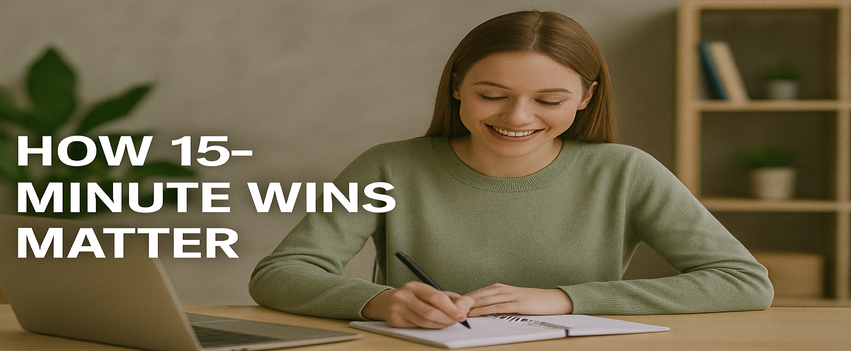
How 15-Minute Wins Matter?
Just fifteen minutes a day could change your career. What happens within that short amount of time? Most people fail to start something despite making plans for hours, mentally preparing for the beginning, and making promises to themselves. When the moment comes, you freeze. So, the next day, you go through the same things. You repeat the same procedures. Yet, there is no improvement. This is where you have to start the smallest step of the first step. Imagine this process as building something out of legos. You start with just one piece. It is just a matter of time before you complete the entire thing that you had imagined. This is called micro-momentum.
What is Micro-Momentum?
Actions that are consistent and short and which can be built up over time are the foundation of micro-momentum. In the past, productivity was considered as working long hours and hustling several tasks at the same time. Nowadays, productivity is not equal to that. It is managing to take the first step. Start small. You can read a single article, send one networking message, or update one bullet point in your resume. The tiny effort leads up to the whole.
Why Do Many People Find it Difficult to Start?
Many envision the end goal, the steps leading to it, and feel overwhelmed. Because many see the weight that comes with the project. So, it is wrong to consider that people are just lazy. Perfection comes with time. Don’t think that you have to get it right the first time. When you don’t get it right on the first try you feel demotivated to start again. This is called the ‘all-or-nothing mindset.’
Why does Micro-Momentum work?
Your brain rewards even the tiniest movement. When you take action, even the smallest action, your brain releases dopamine, and it makes you feel good. It builds momentum. Action comes before motivation. You don’t need to feel motivated to act. You need to act to feel motivated. Once you have started the momentum, you won’t have any trouble keeping going. Each micro-achievement indicates that you’re one step forward in achieving your goal and that progress is being made. This builds confidence. Start every day with one achievable task on your mind. Completing it creates positivity, and the entire day feels the same.
Starting again can be overwhelming especially when you feel stuck or stressed. To increase small wins use the ‘2-Minute-Rule’ found by productivity expert James Clear. This rule tells you to start any task that takes less than two minutes immediately. At Google, teams break goals into smaller parts which can be done faster. Doing so increased progress and success (Source: Kniberg & Ivarsson, 2012).
Small wins help you form your identity. Small actions per day is a vote for the kind of person you want to become. You can write about yourself: “I’m someone who writes every day,” or “I want to build a shelter for women.” Writing about yourself like this not only shows what your goals are but also help habits stick and rewire your brain to continue transformations.
Your micro-achievements compound and when executed consistently, it can generate exponential returns. The 1% rule also applies here. Improving just 1% day gives an overall improvement of 38% for a year (Clear, 2018). It's more about your consistency than intensity. When your employer gives one constructive feedback daily it can reshape team dynamics. These small wins can be silent but they are powerful.
Even to take the first step you need discipline. First, reduce distractions. Put your phone on airplane mode, close unnecessary tabs on your browser, put away other gadgets that are not necessary for your work. Second, keep track of small actions that you’ve taken. Third, reward yourself after three completed small actions. This gives a sense of fulfilment. Fourth, include physical exercises in your small actions. It is good to keep your body moving. Fifth, you can stack positive habits. According to James Clear in his book Atomic Habits, by attaching one good habit to another, you are integrating new behaviors into your life.
If you are ready to take the first 15-minute step, we wish you all the best. Browse new job opportunities at CareerFirst.lk or explore our blog for more strategies for personal and professional growth.
Frequently Asked Questions
1. What is a 15-minute win?
A 15-minute win is a small, focused task you complete in a short time to move forward in your personal or professional goals. It could be reading a short article, writing a paragraph, or updating a section of your resume. These wins help build momentum through consistent micro-efforts.
2. What is micro-momentum?
Micro-momentum is the progress created by completing small, repeated actions. It’s the opposite of all-or-nothing thinking and proves that steady progress, even in small doses, can lead to huge results over time.
3. Why do people struggle to get started on tasks?
Many people feel overwhelmed by the size of their goals or fear that they won’t get it perfect on the first try. This leads to procrastination. The key is to start small without expecting perfection and allow progress to build slowly.
4. How does micro-momentum help build motivation?
Micro-actions trigger the brain’s reward system by releasing dopamine. This gives you a sense of accomplishment, which builds motivation. The more consistently you act, the more momentum and confidence you gain.
5. What is the 2-Minute Rule, and how can I use it?
The 2-Minute Rule, introduced by James Clear, suggests that if something takes less than two minutes to do, do it immediately. This rule helps you overcome procrastination and builds momentum for larger tasks.
6. Can small actions really impact my career growth?
Yes. Small daily efforts such as networking, learning, journaling, or refining your resume gradually shape your skills, mindset, and professional identity. These micro-achievements compound over time and can lead to significant career shifts.